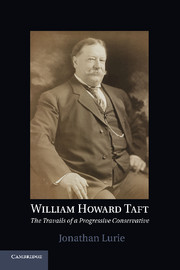Book contents
2 - Judges and Justice, 1887–1900
Published online by Cambridge University Press: 05 December 2011
Summary
Will Taft never wrote his memoirs, and the man he had counted on to write an “authorized” biography, his friend and confidante Gus Karger, died in 1924. Had he been so disposed to write of his past, however, there is no doubt that he would have placed positive emphasis on his years as a judge, and especially later as chief justice. Mention has already been made of Taft’s tendency to need prodding and pushing for his career and his self-doubt concerning his own qualities for success, On the bench, he found a welcomed respite from all of this. In his courtroom, he was master, handing down decisions in an unhurried atmosphere far removed from the rough world of Ohio politics. There, his word was law, even as he held in his hands the fate of defendants who came before him. His three years on the superior court convinced him that a judicial career would be the most rewarding goal he could attain. And while he would suffer much travail and endure humiliating disappointments in later life, his final judicial career (his third) proved him absolutely correct.
Taft’s major biographer, Henry Pringle, has commented on the remarkable frequency with which Taft wrote about his various activities. But if Taft was facile with the pen, he was less than fluent in his writing style. Both as a jurist and as Chief Executive, his prose was solid, ponderous, and all too often overly extensive. One need only compare his inaugural address in 1909 with that of his successor Woodrow Wilson in 1913 to understand this point. Although, as will be seen, there are a few exceptions to this generalization, Taft could not find elegance in his writing, be it either in judicial decisions or in affairs of state. The occasional eloquence of Louis Brandeis and the epigrammatic wit of Oliver Wendell Holmes, two of Taft’s future colleagues on the High Court, will not be seen in Taft’s written work. On the other hand, even as early as his superior court tenure, his opinions were carefully crafted, thoroughly researched, well grounded in precedent, and to a very great extent upheld by the Ohio Supreme Court. Moreover, they reflect some values that Taft held for the remainder of his life, as an examination of two early Taft decisions will demonstrate. They may serve as typical examples of his approach toward juridprudence.
- Type
- Chapter
- Information
- William Howard TaftThe Travails of a Progressive Conservative, pp. 20 - 38Publisher: Cambridge University PressPrint publication year: 2011



